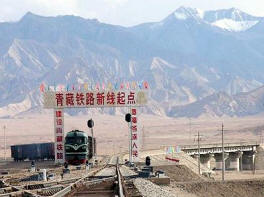Tired Passengers Stumble off First Train to Lhasa, Tibet
AP-- China's first train from Beijing to Tibet made the final leg of its two-day journey on the world's highest railway, reaching Lhasa yesterday after climbing to high elevations that sickened passengers and tested the specially built rail cars.
Girls, some dressed in track suits and others in traditional Tibetan robes, draped white scarves, a customary gift of greeting, on passengers in the newly built Lhasa railway station.
Many passengers spent the day coping with the altitude, breathing piped-in oxygen from tubes as the train passed its highest point, the 5,072-metre Tanggula Pass. Three passengers threw up, while others had headaches both symptoms of altitude sickness.
Outside, Tibetan antelope and wild donkeys grazed beneath snow-capped mountains and deep-blue skies.
Aside from being a feat of engineering, the $4.2 billion (Dh15.4 billion) railway is part of efforts to develop China's poor, restive west and bind it more closely to the booming east. Chinese leaders hope greater prosperity will help to still calls by Tibetans and other ethnic minorities for autonomy from the communist Beijing government.
The line has prompted protests by activists who say it will bring an influx of Chinese migrants to the isolated Himalayan region, threatening its ecology and diluting its unique Buddhist culture.
Trains completed shorter trips on the line between Lhasa and Golmud while passengers on the 16-car train from the Chinese capital were in the midst of their journey.
State media gave heavy coverage to the railway, with newspapers publishing front-page photos of passengers singing and villagers waving to the passing train. The state television midday news showed President Hu Jintao congratulating workers who built the line. Before the last leg of the trip to Lhasa, the train stopped in Golmud early Monday to switch its standard engine for three powerful locomotives required to haul the train at high altitude.
One Tibetan passenger asked a Western reporter what the Dalai Lama, the exiled Tibetan spiritual leader, thought of the train. The man, who asked not to be identified by name, said that with China's internet monitoring, it was too dangerous for him to search news websites for the information himself.
After the train climbed above 4,000 meters, ballpoint pens and bags of processed food burst due to the low air pressure. Laptop computers and digital music recorders failed, because moving parts in their disc drives are cushioned by tiny air bags that break at high altitude.
